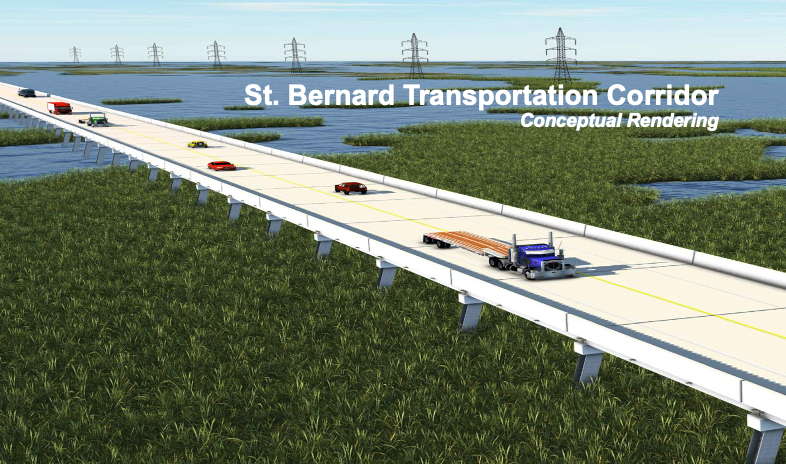Press
Releases
Governor Edwards Praises Regional Planning Commission's Award of Feasibility Study to Support Louisiana International Terminal Transportation Infrastructure

Contact: govpress@la.gov
Regional Planning Commission and Port of New Orleans to Jointly Fund Study for New Corridor in St. Bernard Parish
BATON ROUGE, LA - June 14, 2023 - Governor John Bel Edwards today praised the award of a contract to study the St. Bernard Transportation Corridor, among other roadway improvements, to support the Louisiana International Terminal, a $1.8 billion container terminal planned by the Port of New Orleans (Port NOLA) in Violet, Louisiana. The new terminal will be able to serve vessels of all sizes, dramatically increasing Louisiana’s import and export capacity and stimulating the creation of more than 18,000 jobs statewide and more than $1 billion in local and state tax revenue.
“Investments in economic infrastructure projects, such as the Louisiana International Terminal, that provide quantifiable jobs and economic impact, must be prioritized over ideological and political differences,” said Gov. John Bel Edwards. “The State of Louisiana remains fully committed to this project and is exploring ways to address the Ports immediate needs.”
The Regional Planning Commission (RPC) awarded the Lower St. Bernard/Louisiana International Terminal Roadway Network and Resilience Study to GIS Engineering, LLC. The study marks the next phase of the St. Bernard Transportation Corridor project, an elevated roadway that will connect the future Louisiana International Terminal with I-510 and create a new major artery in and out of St. Bernard Parish.
“My Administration, along with legislative leadership, committed $50 million in the State’s Capital Outlay bill to ensure these critical infrastructure projects move forward to support the Louisiana International Terminal development and to ensure the residents of St. Bernard Parish have the modern infrastructure in place for future economic development and population growth,” said Gov. Edwards. “The new terminal, along with the supporting infrastructure, will benefit residents and businesses throughout Louisiana and the nation and will attract advanced manufacturing, agribusiness, logistics and distribution investments.”
The State Bond Commission provided a cash line of credit of $2 million of the total commitment to Port NOLA for its role in the transportation study earlier this year. The other $48 million remains in the bill to leverage State dollars to match future federal grant applications designated for the planned St. Bernard Transportation Corridor.
In December of 2022, Gov. Edwards announced the historic public-private partnership between Port NOLA, the State and two global maritime industry leaders – Ports America and Terminal Investment Limited (TIL) – to build the terminal. Partners Ports America and TIL have together committed $800 million to the terminal development, along with a $500 million commitment from Port NOLA. The new terminal is currently in the permitting phase of the U.S. Army Corps of Engineers’ environmental review process.
“I want to thank Governor Edwards for his support of this historic investment in Louisiana,” said Brandy D. Christian, President and CEO of the Port of New Orleans and the New Orleans Public Belt Railroad. “The Louisiana International Terminal and its supporting infrastructure will benefit all corners of the State and enhance Louisiana’s global gateway for generations to come. We are pleased that this new terminal is serving as a catalyst project for a long-needed roadway in St Bernard.”
“This is the result of a lot of hard work by St. Bernard leaders along with the Port, the State and the Legislature, and this study will address serious traffic issues and is aimed at protecting the citizens of St. Bernard Parish,” said St. Bernard Parish President Guy McInnis. “This shows that the Governor and Port remain serious about delivering a project that is beneficial to the people of St. Bernard and will address and answer impacts that may come.”